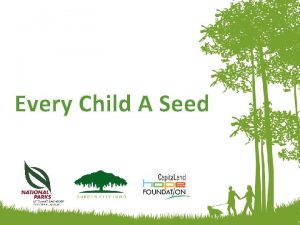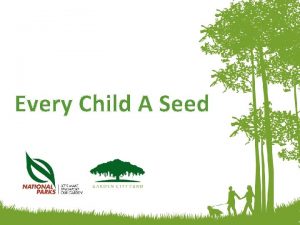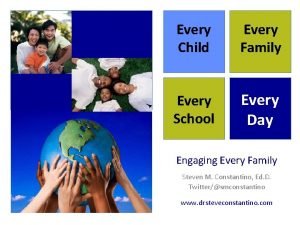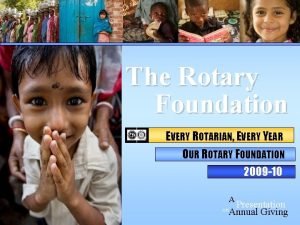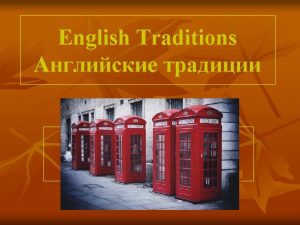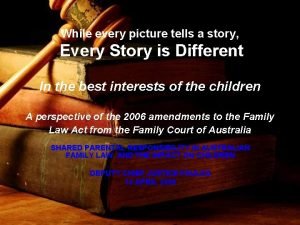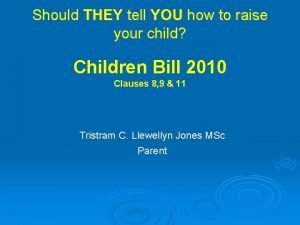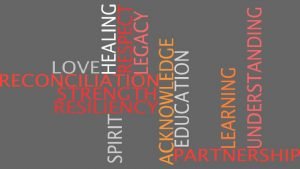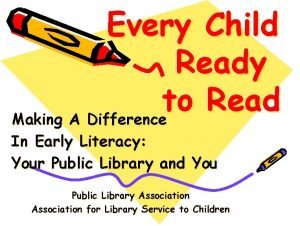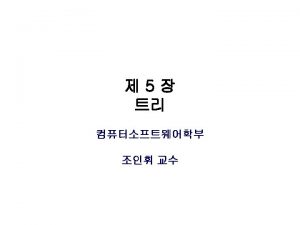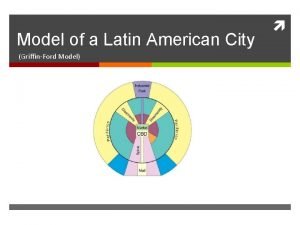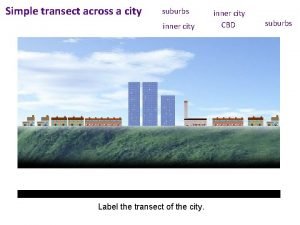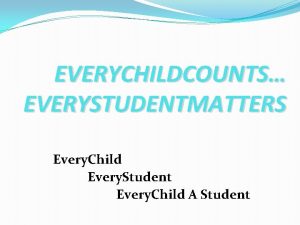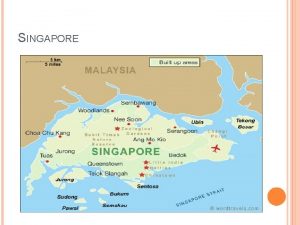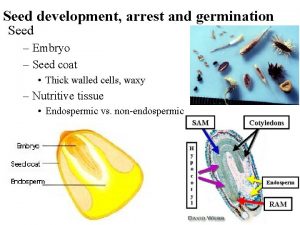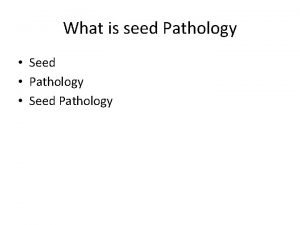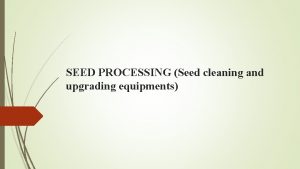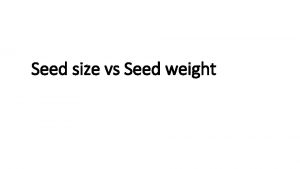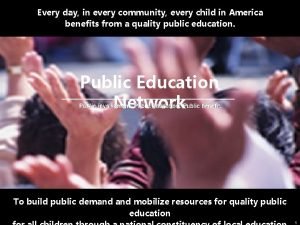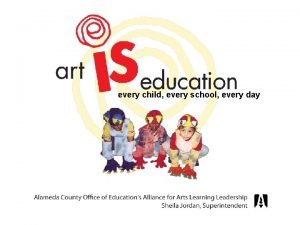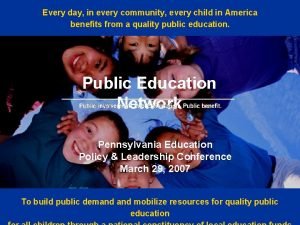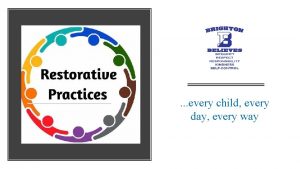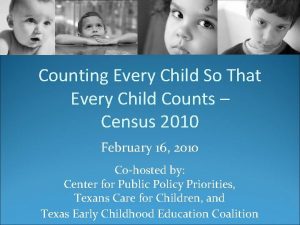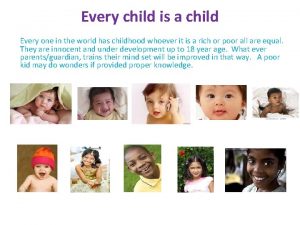Every Child A Seed Singapore a City in


















- Slides: 18

Every Child A Seed

Singapore, a City in a Garden https: //www. youtube. com/watch? v=j. LRROk. GGBf. M

Our Garden City History • It all began on 16 June 1963 - Mr Lee Kuan Yew planted a tree in Farrer Circus, signifying the start of the tree planting campaign. • Fast-growing, shady trees were planted, flyovers and overhead bridges were covered with creeper plants, and green parks dotted the island. • NParks commemorated 50 years of Greening Singapore in 2013.

City in a Garden – Importance of the Community • Our natural environment that you see today took more than 50 years of hard work, dedication and cooperation with the community. • Everyone has a part to play in caring for our City in a Garden. This includes people like yourselves – educators and students! As future leaders of Singapore, the young have a very important role when it comes to conserving nature and biodiversity.

What is Every Child A Seed? • A programme started in 2013 to enable pupils nationwide to commemorate 50 Years of Greening Singapore. • Aims to convey to pupils that every Singaporean plays a part in shaping our City in a Garden. • Provides pupils with an opportunity to go through and appreciate the challenges of the planting process and experience the joy of seeing their plants grow. • Akin to the process of building our City in a Garden – need dedication, commitment and involvement from the community.

What the programme entails • Every Primary 3 pupil will receive a plant starter kit. • Teachers are encouraged to carry out the suggested lessons found in the Teachers’ Resource Kit. • Teachers will teach pupils how to plant the seeds and record and track the growth of their plants in their plant journal. • Pupils are encouraged to send photographs of their full-grown plants to the National Parks Board via email to haniza_yusuff@nparks. gov. sg

What schools will receive • One copy of the Every Child A Seed video • Plant Starter Kits for Primary 3 pupils: A small pot A packet of potting mix A packet of seeds (containing Sunflower, Roselle or Kangkong seeds) A copy of My Plant Journal

Supporting resources Every Child A Seed video available at https: //www. youtube. com/watch? v=Szb. PJI 2 Ap. Lk • Teacher’s Resource Kit • Lesson 1 powerpoint slides • Lesson 2 powerpoint slides • Activity Worksheet 1 for Lesson 1 • Activity Worksheet 2 for Lesson 1 Available online at https: //www. nparks. gov. sg/learning/programmes-forschools/every-child-a-seed/online-resources

Supporting resources: Every Child A Seed video Introduction to our City in a Garden Step-by-Step Planting Process Common Planting Mistakes

Supporting resources: Lesson Plan 1 & powerpoint slides Learning objectives: • Appreciate the importance of plants • Understand why plants are classified as living things • Identify the different parts and their functions

Supporting resources: Lesson Plan 2 & powerpoint slides Learning objectives: • Be able to grow plants from seeds • Know the conditions necessary for germination to take place • Appreciate the challenges of the planting process • Understand that a City in a Garden requires care and nurturing

Supporting resources: Activity Worksheet 1 for Lesson 1

Supporting resources: Activity Worksheet 2 for Lesson 1

Frequently Asked Questions Q: How is Every Child a Seed relevant to what pupils learn in school? A: The programme has been tailored to complement the Primary 3 Science Syllabus on Diversity. Pupils will learn about the life cycle of a plant, plant parts and their functions. The lessons will also teach them the values of care and responsibility. Q: What is the cost of adopting the programme? A: The programme is free. It is fully sponsored by the Garden City Fund, a registered charity supported by NParks. Q: Will teachers who will be running this programme be given a plant starter kit too? A: We have provided enough kits to each school such that each Primary 3 Science teacher will receive a kit.

Frequently Asked Questions Q: When will schools be receiving the plant starter kits? A: Schools can expect to receive the kits between end May and end July. As the courier company will be grouping the schools based on location, it is not possible for us to determine when exactly a particular school will be receiving the kits. We appreciate the understanding of all schools in this. Q: Can my school use the resources for other levels besides Primary 3? A: While we encourage schools to use the kits for Primary 3 cohort due to its relevance to P 3 science, schools are free to re-distribute the starter kits to students in other levels. The number of starter kits delivered to schools however, is based on the Primary 3 cohort unless otherwise specified by the school. Q: Where can I obtain additional planter kits? A: Schools can write in to haniza_yusuff@nparks. gov. sg from end July and we will try to accommodate the request. Schools may also consider making their own purchases of planting pots, potting mix and seeds from nurseries.

Frequently Asked Questions Q: Is there a deadline for schools to carry out the programme? My school is covering the topic on plants only in Term 3/4. A: There is no deadline for schools to carry out the programme. However, for the seeds to have a better chance of successful germination, they should ideally be planted within 1 -2 months upon receiving the planting kits. This is because prolonged storage may affect the rate of germination of the seeds. • Seeds should be kept under dark, dry, cool and air-tight conditions. Seal seeds in dark, air-tight bags and place in a cupboard, away from direct sunlight or in a refrigerator at 10˚C. • Consider planting the Roselle (Hibiscus sabdariffa) seeds within 1 - 2 weeks after receiving them as their rate of germination tends to decline rapidly with prolonged storage.

Frequently Asked Questions Q: Can my school request for Sunflower/Kang Kong/Roselle seeds only? A: We will be allocating schools a mixture of all 3 seeds. The reason we are using 3 types of plants is to allow pupils to experience diversity in the plant kingdom. With the 3 types of plants, pupils can then make comparisons of the different conditions under which these plants grow well. Q: How strictly do I have to follow the lesson plans? A: The lesson plans are optional. While we encourage teachers to carry out both lessons, they are merely guides which teachers can adapt however they see fit. Q: Who do I contact if I have any queries? A: Teachers and pupils can visit our website, XXX, where more FAQs can be found. If the info on the website does not address your question, please write to haniza_yusuff@nparks. gov. sg.

Useful links 1. National Parks Board website https: //www. nparks. gov. sg 2. National Parks Learning portal https: //www. nparks. gov. sg/learning 3. Every Child a Seed webpage https: //www. nparks. gov. sg/learning/programmes-for-schools/every-child-aseed 4. Flora&Fauna. Web https: //florafaunaweb. nparks. gov. sg/ 5. National Parks You. Tube channel https: //www. youtube. com/user/nationalparksboard/videos
 Every child a seed
Every child a seed Every child a seed
Every child a seed Every child every day
Every child every day Every rotarian every year
Every rotarian every year Every nation and every country
Every nation and every country Every nation and every country
Every nation and every country Empower every person and every organization
Empower every person and every organization Every picture has a story and every story has a moment
Every picture has a story and every story has a moment Every knee shall bow every tongue confess
Every knee shall bow every tongue confess Why was every child matters scrapped
Why was every child matters scrapped Every child matters be healthy
Every child matters be healthy Orange shirt day quotes
Orange shirt day quotes Every child ready to read six skills
Every child ready to read six skills Every child is gifted they just unwrap
Every child is gifted they just unwrap Pta every child one voice
Pta every child one voice Tag question every mother loves her child
Tag question every mother loves her child Left child right sibling tree
Left child right sibling tree Griffon ford model
Griffon ford model Cbd inner city suburbs
Cbd inner city suburbs
